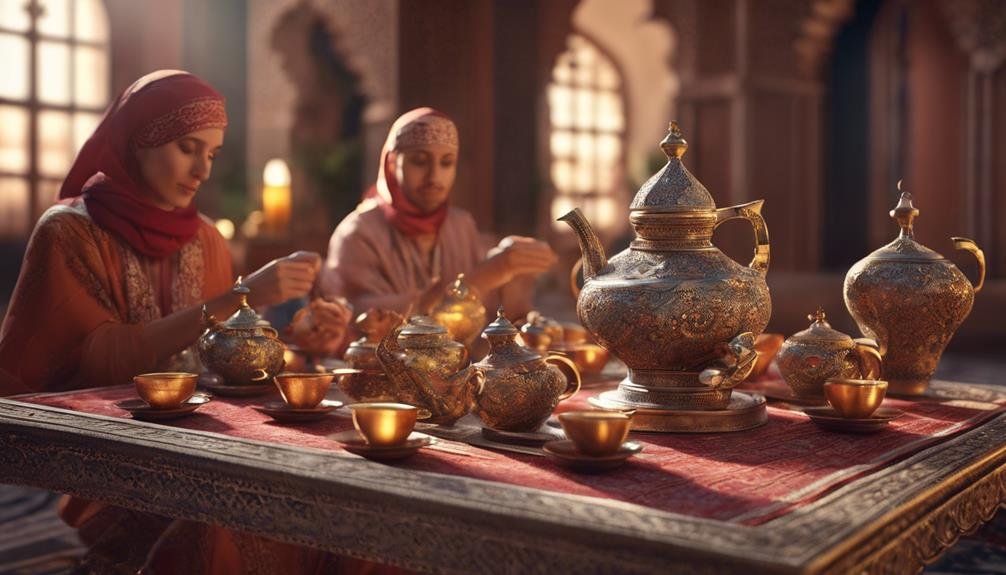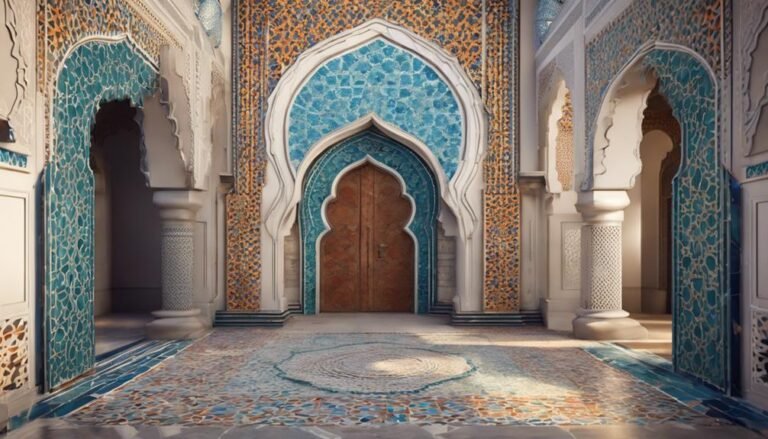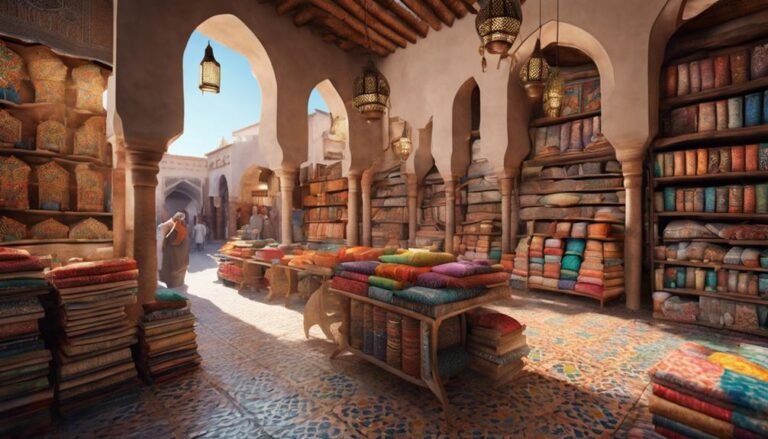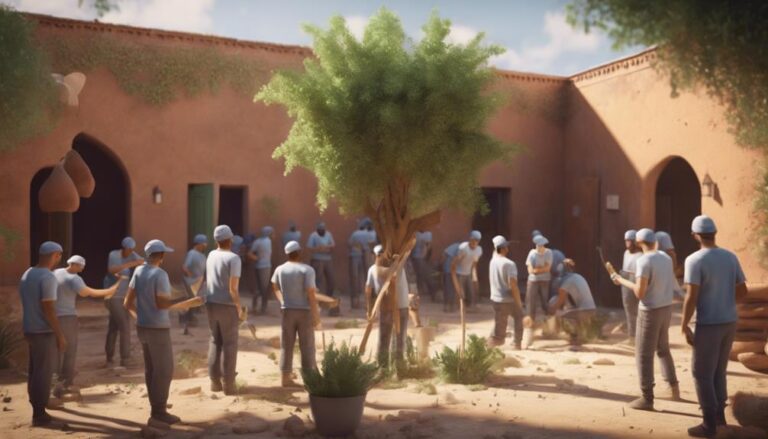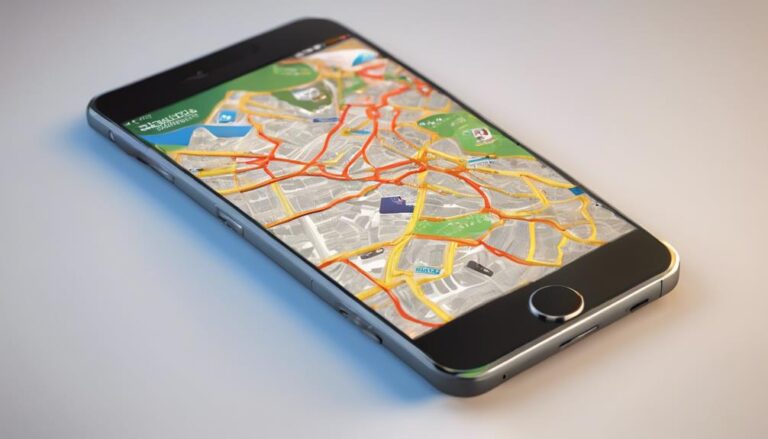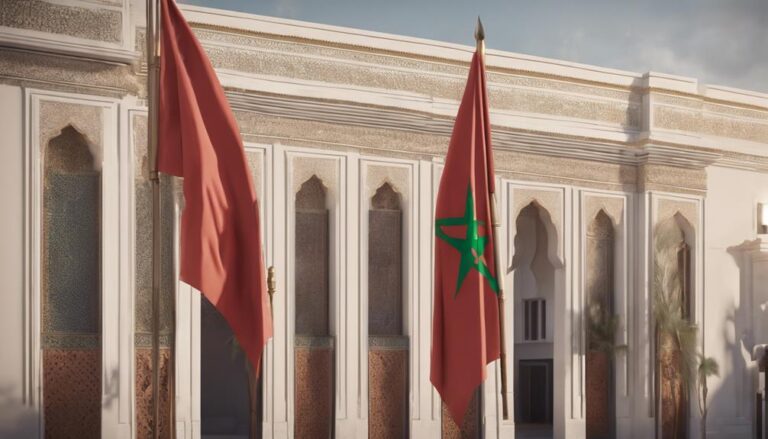In Morocco's business world, handshakes are common, but men and women greet with a light touch. Starting conversations by acknowledging the eldest or most senior person is a must. Your communication style should combine formality and warmth. Be direct yet polite and attentive to nonverbal cues. Establishing personal relationships through trust-building and networking is foundational. Dress modestly and conservatively, as appearance greatly influences impressions. During meetings, use Arabic and French, respect hierarchy, and honor senior members. Maneuvering these etiquette nuances in Morocco blends tradition and professionalism seamlessly, offering a unique experience worth exploring further.
Key Takeaways
- Use Arabic and French languages for communication in business settings.
- Prioritize personal connections and networking in meetings.
- Respect hierarchy and titles, showing deference to senior members.
- Dress conservatively and align attire with cultural expectations.
- Engage in small talk, greetings, and handshakes before discussions.
Greetings and Introductions
When greeting someone in Morocco, it's important to be aware of the cultural norms and customs to guarantee a respectful interaction. Formalities play a significant role in greetings, as Moroccans often exchange pleasantries before getting into business discussions. Handshakes are common between people of the same gender, while a light handshake is customary between men and women. It's essential to greet the eldest or most senior person first as a sign of respect, followed by the others in the group.
Social norms dictate that greetings are accompanied by inquiries about the individual's health, family, and general well-being. It's customary to engage in small talk before moving on to the main topic of discussion. Compared to Western cultures, Moroccans may stand closer during conversations, and maintaining eye contact is seen as a sign of attentiveness and respect. Understanding these formalities and social norms will go a long way in establishing positive relationships in a Moroccan business setting.
Communication Styles
In Moroccan business settings, communication styles are characterized by a balance of formality and warmth, reflecting the cultural emphasis on respect and personal connections. When it comes to verbal communication, Moroccans appreciate directness while also valuing politeness and tact. They tend to use clear language to express their thoughts and opinions but often soften their messages with courteous phrases to maintain harmony in the conversation. Nonverbal cues play a significant role in communication as well. Body language, such as maintaining eye contact and using hand gestures, can convey attentiveness and interest during discussions.
Moroccan communication styles also exhibit a blend of direct and indirect approaches. While they appreciate straightforwardness in business dealings, Moroccans may sometimes convey messages indirectly to avoid causing offense or confrontation. This indirect style can be observed in situations where feedback or criticism is given subtly to preserve relationships and harmony within the business environment. Understanding both verbal and nonverbal cues, as well as the balance between direct and indirect communication, is essential for effective interactions in Moroccan business settings.
Importance of Personal Relationships
Establishing strong personal relationships is pivotal in Moroccan business culture for fostering trust and mutual understanding among colleagues and partners. In Morocco, the importance of personal connections can't be overstated, and it greatly influences business interactions.
Here are three key aspects highlighting the significance of personal relationships in Moroccan business etiquette:
- Building Trust: Trust is the foundation of business relationships in Morocco. Developing a personal connection with your Moroccan counterparts is essential for establishing trust. Sharing meals, engaging in small talk, and showing genuine interest in their culture can go a long way in building trust.
- Networking Strategies: Networking plays an important role in Moroccan business culture. Attending social gatherings, such as dinners or tea ceremonies, provides opportunities to connect with potential business partners on a personal level. Utilize these networking events to build relationships that can benefit your business endeavors.
- Cultural Understanding: Demonstrating an understanding and appreciation of Moroccan culture shows respect and sincerity. Taking the time to learn about Moroccan traditions, greetings, and communication styles can help in forming meaningful personal relationships that transcend mere business transactions.
Dress Code and Appearance
To make a lasting impression in Moroccan business circles, your choice of attire and grooming must align with the cultural expectations and norms prevalent in the country. When it comes to professional attire in Morocco, it's essential to dress conservatively and modestly. Men typically wear suits or dress pants with a shirt and tie, while women opt for modest and elegant business suits or dresses that cover the shoulders and knees. It's important to avoid clothing that's too revealing or flashy, as this may be viewed as inappropriate in the conservative Moroccan business environment.
In Moroccan culture, appearance plays a significant role in how individuals are perceived. Grooming is vital, and it's expected that both men and women maintain a neat and polished look. Paying attention to small details such as well-kept hair, clean nails, and minimalistic accessories can demonstrate respect for the business setting and contribute to a positive impression. By adhering to these cultural norms regarding dress code and appearance, you can show your professionalism and respect for the Moroccan business environment.
Business Meeting Etiquette
Conducting business meetings in Morocco demands a nuanced understanding of cultural customs and expectations to guarantee successful interactions and outcomes. When it comes to business meeting etiquette in Morocco, here are some key points to keep in mind:
- Language use: Arabic and French are the most commonly spoken languages in business settings in Morocco. While French is widely understood, incorporating some basic Arabic phrases can show respect for the local culture and may help in building rapport with your Moroccan counterparts.
- Meeting agenda: It's essential to have a well-defined meeting agenda that outlines the topics to be discussed. However, be prepared for meetings to potentially veer off-course as Moroccans value building relationships and may prioritize discussions that strengthen personal connections over sticking strictly to the agenda.
- Respect for hierarchy: In Moroccan business culture, there's a strong emphasis on hierarchy and respect for elders or those in positions of authority. It's important to address individuals by their titles and show deference to senior members during meetings to demonstrate respect and courtesy.
Conclusion
To sum up, when conducting business in Morocco, keep in mind the significance of personal relationships and respect for cultural traditions. As the saying goes, 'When in Rome, do as the Romans do.'
By adhering to proper business etiquette and understanding the local culture, you can establish strong connections and achieve success in your endeavors.
Embrace the unique customs and values of Morocco, and you'll be well on your way to forging fruitful partnerships.

The Editorial Team is a passionate group of Morocco enthusiasts dedicated to sharing the beauty, culture, and wonders of this captivating country. With diverse backgrounds and a deep love for travel, we strive to bring you engaging and informative content that inspires your Moroccan adventures. From uncovering hidden gems and sharing local insights to exploring mouthwatering cuisine and showcasing the vibrant lifestyle, our team is committed to providing you with valuable resources and exciting stories that enhance your exploration of Morocco. Join us on this journey as we celebrate the rich heritage and unforgettable experiences that make Morocco truly special.

